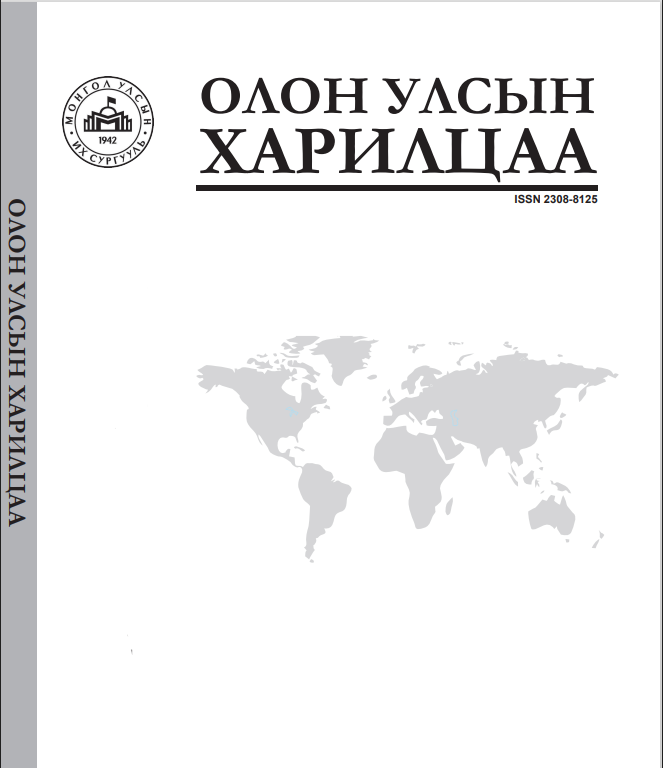Стратегийн түншлэлийн тухай үзэл баримтлал: Монгол-Японы харилцааны жишээн дээр Л.Бямбаханд
Main Article Content
Abstract
Strategic partnership, a contemporary paradigm in the dynamic landscape of international relations, represents a novel and collaborative approach to addressing the multifaceted challenges that have emerged in the global arena. As nations navigate the complexities of an ever-evolving geopolitical landscape, strategic partnerships have become instrumental in fostering cooperation and mitigating the complexities that arise in the realm of international affairs.
Within the realm of scholarly exploration, the author explores the essence of strategic partnerships by delving into the Japanese literature on the subject matter. This scholarly pursuit aims to unravel the nuanced components that define and characterize strategic partnerships, drawing insights from Japan’s extensive experience in navigating intricate diplomatic relations.
Furthermore, this article serves as an illuminating beacon on the strategic partnership between Mongolia and Japan, offering a comprehensive exploration of the political, economic, cultural and defense dimensions that underpin their collaborative efforts. The researcher’s perspectives and insights are seamlessly woven into the narrative, providing a nuanced understanding of the intricacies inherent in the Mongolia-Japan strategic partnership.
Downloads
Article Details
References
Andrew L. Oros, (2008) Normalizing Japan: Politics, Identity, and the Evolution of Security Practice. Stanford, CA: Stanford University Press.1
Christopher W. Hughes (2004) “Japan’s Security Agenda: Military, Economic & Environmental Dimensions” Boulder, CO: Lynne Rienner
Lakhvinder Singh, “India-Japan strategic partnership must include Korea: Indian strategic thinkers who are putting all their eggs in the Japanese basket and ignoring South Korea are making a strategic blunder” (Jan 9, 2020) https://asiatimes.com/2020/01/india-japan-strategic-partnership-must-include-korea/
Nobuo Okawara, Peter J. Katzenstein (2008) “Japan and Asian-Pacific security: regionalization, entrenched bilateralism, and incipient multilateralism”, in P. Katzenstein (ed.), Rethinking Japanese Security: Internal and External Dimensions, pp. 104–132. Abingdon: Routledge
Richard J. Samuels, (2007) Securing Japan: Tokyo’s Grand Strategy and the Future of East Asia. Ithaca, NY: Cornell University Press
Takashi Terada, (2010) “Evolution of the Australian–Japan Security Partnership: Toward a Softer Triangle Alliance with the United States?”, Japan Program, IFRI Center for Asian Studies https://www.ifri.org/sites/default/files/atoms/files/av35_terada_japan-australia-us_alliance_2010.pdf
Thomas S. Wilkins,“Japan’s alliance diversification: a comparative analysis of the Indian and Australian strategic partnerships” International Relations of the Asia-Pacific Volume 11 (2011) 115–155
Vidaya Nadkarni, (2010) Strategic Partnerships in Asia: Balancing without Alliances. Abingdon: Routledge

